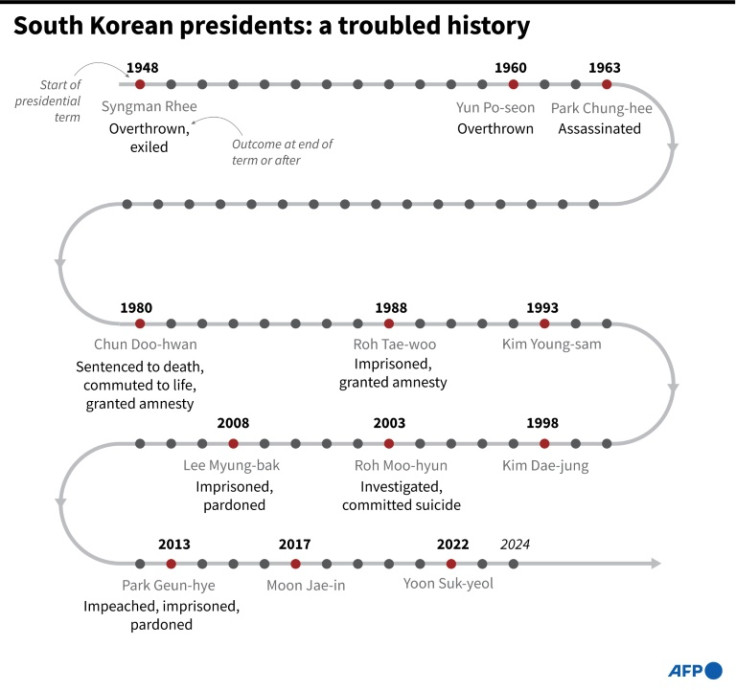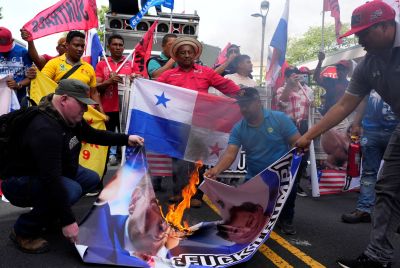Crisis To Brink Of Impeachment: South Korea's Isolated President

South Korean President Yoon Suk Yeol has staggered from one crisis to another since winning power but he topped it all this week by declaring martial law and sending troops and helicopters to parliament.
The plunge back to South Korea's dark days of military rule only lasted a few hours, and after a night of protests and high drama Yoon was forced into a U-turn in the early hours of Wednesday.
But polls show a huge majority of citizens want him out and lawmakers were due to vote Saturday on an impeachment motion brought by the opposition, who control parliament.
However it was unclear whether the bill would garner the sufficient two-thirds majority to pass with Yoon's ruling People Power Party (PPP) apparently split.
This is despite the PPP's leader Han Dong-hoon -- allegedly on an arrest list the night of the martial law declaration -- saying Yoon's resignation was "inevitable".
On Saturday before the vote, Yoon spoke publicly for the first time in days, apologising for the "anxiety and inconvenience" he caused, but stopping short of throwing in the towel.
Instead the 63-year-old said he would "entrust the party with measures to stabilise the political situation, including my term in office".
Born in Seoul in 1960 months before a military coup, Yoon studied law and went on to become a star public prosecutor and anti-corruption crusader.
He played an instrumental role in Park Geun-hye, South Korea's first female president, being convicted of abuse of power, imprisoned and impeached in 2016.
As the country's top prosecutor in 2019, he also indicted a top aide of Park's successor, Moon Jae-in, in a fraud and bribery case.
The conservative PPP, in opposition at the time, liked what they saw and convinced Yoon to become their presidential candidate.
He duly won in March 2022, beating Lee Jae-myung of the Democratic Party, but by the narrowest margin in South Korean history.
Yoon was never much loved by the public, especially by women -- he vowed on the campaign trail to abolish the ministry of gender equality -- and scandals have come thick and fast.
This included his administration's handling of a 2022 crowd crush during Halloween festivities that killed more than 150 people.
Voters have also blamed Yoon's administration for food inflation, a lagging economy and increasing constraints on freedom of speech.
He was accused of abusing presidential vetoes, notably to strike down a bill paving the way for a special investigation into alleged stock manipulation by his wife Kim Keon Hee.
Yoon suffered further reputational damage last year when his wife was secretly filmed accepting a designer handbag worth $2,000 as a gift. Yoon insisted it would have been rude to refuse.
His mother-in-law, Choi Eun-soon, was sentenced to one year in prison for forging financial documents in a real estate deal. She was released in May 2024.
Yoon himself was the subject of a petition calling for his impeachment earlier this year, which proved so popular the parliamentary website hosting it experienced delays and crashes.
As president, Yoon has maintained a tough stance against nuclear-armed North Korea and bolstered ties with Seoul's traditional ally, the United States.
Last year, he sang Don McLean's "American Pie" at the White House, prompting US President Joe Biden to respond: "I had no damn idea you could sing."
But his efforts to restore ties with South Korea's former colonial ruler, Japan, did not sit well with many at home.
Yoon has been a lame duck president since the opposition Democratic Party won a majority in parliamentary elections this year. They recently slashed Yoon's budget.
In his Tuesday night televised address to the nation, Yoon railed against "anti-state elements plundering people's freedom and happiness" and his office has subsequently cast his imposition of martial law as a bid to break through legislative gridlock.
But to use his political difficulties as justification for imposing martial law for the first time in South Korea since the 1980s is absurd, an analyst said.
"Yoon invoked Article 77 of the South Korean constitution, which allows for proclaiming martial law but is reserved for 'time of war, armed conflict or similar national emergency', none of which appears evident," Bruce Klingner, a senior research fellow at the Heritage Foundation, told AFP.
"Yoon's action is a damning reversal to decades of South Korean efforts to put its authoritarian past behind it," he said.

© Copyright AFP 2024. All rights reserved.





















